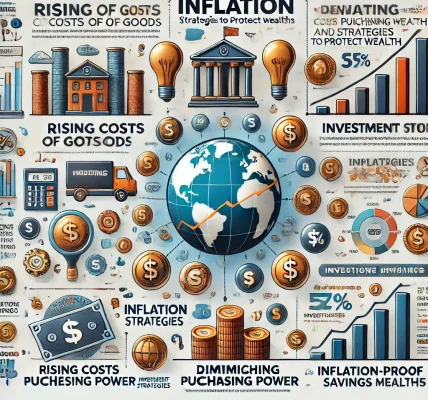Economic uncertainty can create challenges, but it also presents an opportunity to take control of your financial future. Whether facing inflation, market volatility, or job insecurity, having a sound financial plan is crucial to navigating these uncertain times. In this blog, we’ll outline practical strategies to help you safeguard your finances and stay on track with your financial goals.
Why Financial Planning Matters During Economic Uncertainty
- Resilience: A strong financial plan helps you weather unexpected challenges.
- Confidence: Knowing your finances are in order reduces stress and anxiety.
- Opportunity: Economic downturns often present investment opportunities for those prepared.
1. Assess Your Financial Situation
Start by gaining a clear understanding of your current financial position:
- Net Worth: Calculate your total assets (savings, investments, property) minus your liabilities (debts).
- Cash Flow: Review your income and expenses to identify areas for improvement.
- Emergency Fund: Ensure you have 3-6 months’ worth of living expenses set aside.
Pro Tip: Use tools like Mint or Personal Capital to track your finances effectively.
2. Create or Revisit Your Budget
During uncertain times, a well-structured budget is essential. Focus on:
- Essential Expenses: Prioritize needs such as housing, utilities, groceries, and healthcare.
- Discretionary Spending: Reduce non-essential expenses like dining out, subscriptions, or luxury purchases.
- Savings Goals: Allocate a portion of your income toward savings and investments.
Helpful Tool: Apps like YNAB (You Need A Budget) can help you stay disciplined.
3. Build an Emergency Fund
Economic uncertainty underscores the importance of an emergency fund. Here’s how to build one:
- Start small by saving a portion of each paycheck.
- Automate transfers to a dedicated high-yield savings account.
- Aim to save at least 3-6 months’ worth of essential expenses.
Pro Tip: Use any windfalls, such as tax refunds or bonuses, to boost your fund.
4. Diversify Your Income Streams
Relying on a single source of income can be risky. Consider:
- Side Hustles: Freelancing, tutoring, or selling products online.
- Passive Income: Investing in dividend-paying stocks, real estate, or peer-to-peer lending.
- Upskilling: Acquiring new skills to enhance your career prospects.
Action Step: Identify opportunities that align with your interests and expertise.
5. Revisit Your Investments
Market volatility can be unnerving, but it’s important to stay focused on your long-term goals:
- Diversify: Spread your investments across different asset classes, such as stocks, bonds, and real estate.
- Risk Assessment: Align your portfolio with your risk tolerance and time horizon.
- Avoid Panic Selling: Remember, market downturns are often temporary.
Pro Tip: Consult a financial advisor to ensure your investment strategy aligns with your goals.
6. Pay Down Debt
High-interest debt can strain your finances during economic uncertainty. Focus on:
- Prioritizing Debt: Pay off high-interest debts like credit cards first.
- Debt Snowball or Avalanche Method: Use structured approaches to eliminate debt systematically.
- Avoiding New Debt: Limit borrowing to essential needs.
Helpful Tool: Consider debt consolidation if it reduces your overall interest rate.
7. Protect Your Financial Future
Safeguard your finances with these steps:
- Insurance: Ensure you have adequate health, life, and property insurance.
- Estate Planning: Create or update your will and designate beneficiaries.
- Retirement Savings: Continue contributing to retirement accounts, even during downturns.
Pro Tip: Review your insurance policies annually to ensure they meet your needs.
8. Stay Informed but Avoid Overreacting
Stay updated on economic trends and news, but don’t let fear drive your decisions:
- Reliable Sources: Follow trusted financial news outlets.
- Long-Term Perspective: Focus on your long-term goals rather than short-term market movements.
- Avoid Emotional Decisions: Stick to your financial plan.
Conclusion
Planning your finances during uncertain economic times requires discipline, adaptability, and a clear focus on your goals. By following these strategies, you can build resilience, reduce financial stress, and position yourself for success, no matter the economic climate.



